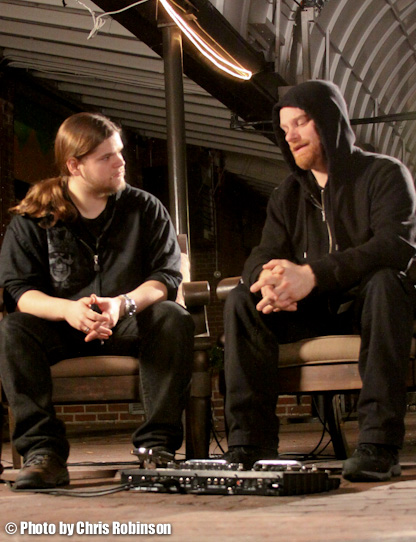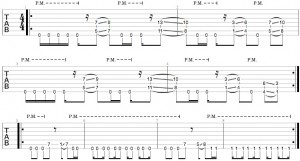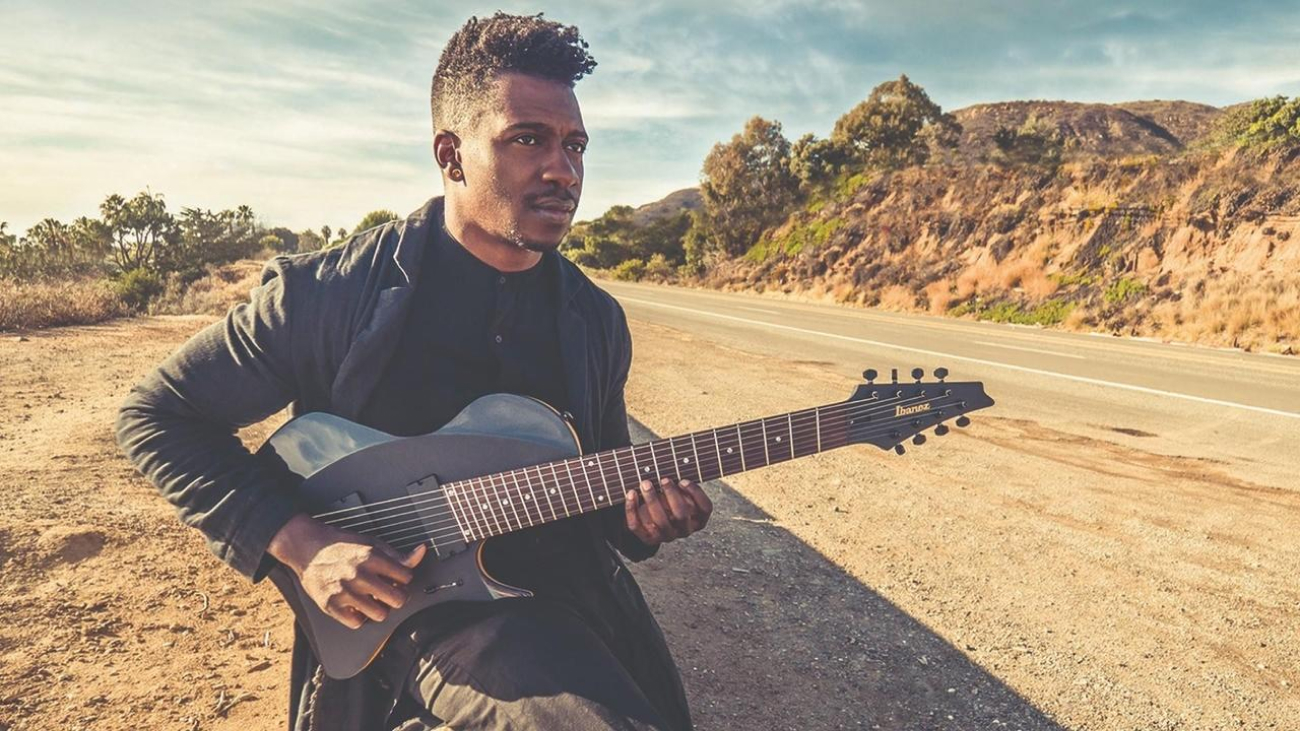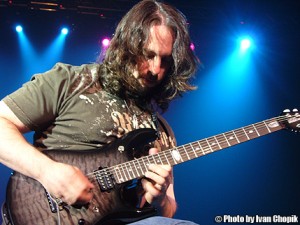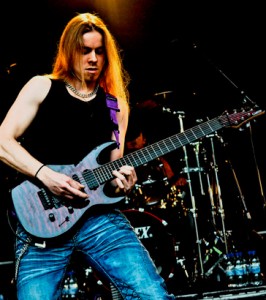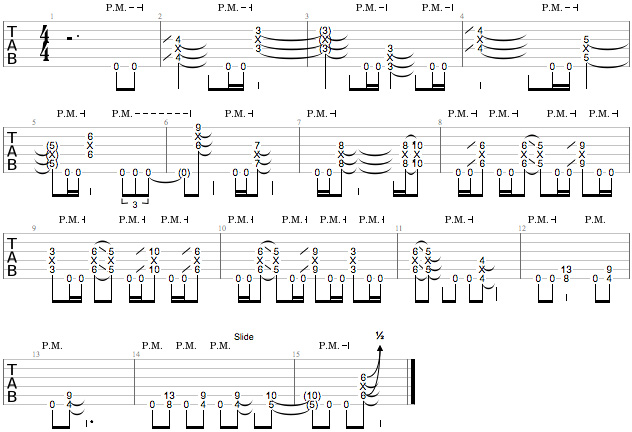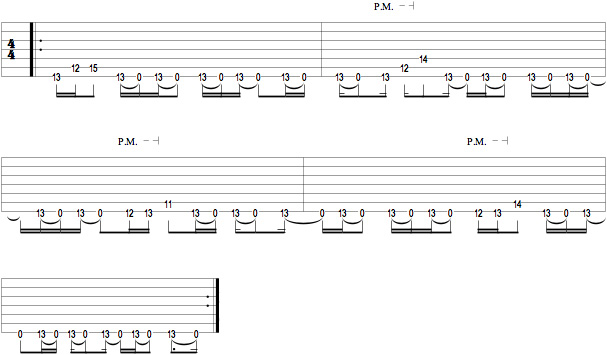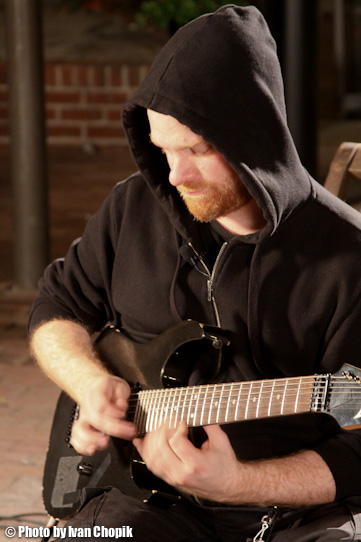 With their progressive blend of melody and brutality, Sweden’s Scar Symmetry are pioneering metal with their own distinct take on the genre. Per Nilsson makes his mark not only as one of Scar Symmetry’s primary songwriters, but also for his fluid touch on the guitar. His playing style quickly shifts from crushing extended-range riffing to elegantly-phrased solos that navigate the shifting sonic landscapes that he creates with his bandmates.
With their progressive blend of melody and brutality, Sweden’s Scar Symmetry are pioneering metal with their own distinct take on the genre. Per Nilsson makes his mark not only as one of Scar Symmetry’s primary songwriters, but also for his fluid touch on the guitar. His playing style quickly shifts from crushing extended-range riffing to elegantly-phrased solos that navigate the shifting sonic landscapes that he creates with his bandmates.
I had the opportunity to speak with Per in Worcester, MA during Scar Symmetry’s tour in support of their latest offering – Dark Matter Dimensions:
IC: How’s the tour going right now?
PN: Pretty good. We’ve played 4 shows so far, so it’s like 24 shows to go.
IC: It’s a big one. You didn’t do as much touring after Holographic Universe since you were going through the lineup changes.
PN: Yeah, we toured earlier this year in the US, and we toured Europe once in support of the Dark Matter Dimensions album. But as you said, after Holographic Universe we went through the whole vocalist change, so we got stuck there for a while.
IC: I understand that you and Jonas [Kjellgren, guitarist] are the main songwriters in Scar Symmetry. Can you talk about that process and how it changed for the new album, especially now that there’s two vocalists?
PN: Yeah, it changed a bit because our previous singer Christian [Älvestam, former vocalist] used to write some of the vocal melodies and arrangements. This time around Jonas and I shared those duties. Since day one, the way we wrote songs was either Jonas or I came up with a basic song – the riffing, the basic drum patterns and some keyboard stuff, and then either me or Jonas or Christian made the vocal stuff on top of that. For the latest album it was almost the same procedure – I came up with a few songs, Jonas came up with a few songs and then Jonas and I sat together with a microphone and did all of the vocal stuff together. So basically I came up with most of the clean stuff and he did the growling arrangements. So it was like: [sings melodic motif followed by gruff growls]. [both laugh]
IC: So did you use actual lyrics, or was it just like that?
PN: We came up with really phony stuff. Actually, we have got the whole album with our vocals on it. It sounds so fucking hilarious.
IC: I would love to hear that. You should release that as a bonus. [laughs]
PN: You won’t ever hear it. [both laugh]
IC: The band doesn’t have a dedicated keyboard player, but there are some really awesome keyboard parts throughout the album. Do you play and program those? How do you do that live?
PN: Live we have all the keyboard parts on backing track. In the studio, we use all kinds of different keyboards. We use hardware keyboards and software synths. Some parts we play and some parts we program, like really fast runs – we cannot play it, because we’re not really keyboard players. But the slower stuff, like pads and stuff like that, we play, because most stuff sounds better if it’s actually played rather than programmed and quantized.
IC: How involved are you in the production process with Scar Symmetry?
PN: For the last album Jonas and I co-produced it, and then he mixed it. But for all of the albums, I’ve been recording all of my solos in my own studio at my home.
IC: What kind of setup do you have to record your parts?
PN: I’ve got a computer with a PreSonus audio interface, and I use different software apps.
IC: What typically goes into your lead tone? You have a very distinct sound.
PN: For the first two albums, I used a Behringer V-Amp – really cheap gear.
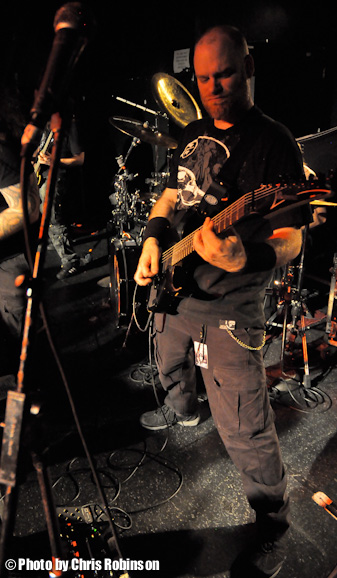
IC: Dark Tranquillity tours with those and have recorded with them as well, from what I understand. It’s a good-sounding unit for it’s price.
PN: People always used to ask what I used for the lead sound on those albums, because they thought it was a great lead sound. But when I listen to it, I think it doesn’t sound really good. It’s got these high frequencies that really pierce your ears. If you crank the volume on the albums, everything sounds really good – but when the solos come, it’s like: [imitates being pierced by high frequencies] ‘Ahh!’ But that’s what was available to me at the time. It was cheap, and you just plug and play.
IC: What has your rig evolved into since then?
PN: For the latest album, I used software amps while recording it, but I recorded the direct signal, so later on we re-amped it. We re-amped it, then we used an Ibanez Tube Screamer, a Rocktron [Egnater] tube head and a Marshall cabinet – we just put a microphone in front of it.
IC: What all goes into your live rig – how does it differ from what you record with?
PN: Live we’ve started using Line 6 gear, so we use the floorboard PODs. Basically we use it because it’s very easy to carry around – we don’t have to have these big stacks like we used to.
IC: Do you go direct into the PA?
PN: Yeah. As long as we have nice monitors it works fine, and it actually makes for a much cleaner sound onstage. You don’t have these big stacks in the back. It’s not such a big mess for the sound engineer, because there’s not all this leakage from the amps into the overheads on the drums and the vocal microphones.
IC: We’ve talked about your recording setup and your gear and amps and everything – tell me more about your guitars – how you set them up and what helps you to do what you do.
PN: I play Ibanez guitars exclusively. Actually, I’ve been playing Ibanez guitars since ’92, I think. I’ve not owned any other brand of guitars since. For the last few years, I’ve been an endorsee, too, so I get some guitars for free. I have a bunch of different 7-string RGs, I’ve got the 7-string Xiphos, I’ve got an 8-string, and I’ve got a 6-string Jem – the Steve Vai model with a flower pattern and the monkey grip. That’s probably my favorite guitar. Of all the albums I’ve put out, I’ve recorded 95% of all the leads with that guitar, because it sounds and plays so amazingly.
IC: What gauge strings do you use?
PN: I use 9-42 on the 6-string, and for the 7-strings I add a 56.
IC: I’m sure you keep your action pretty low to do what you do.
PN: Yeah.
IC: I want to go back in time – I haven’t seen much talk of how you first got into music, and what made you pick up the guitar to begin with.
PN: My dad was playing guitar when I was young. I started playing recorder when I was 9, and then after half a year I switched to violin – I don’t know why. A few months later my dad taught me a few guitar chords, and I was like: ‘Wow! This sounds like rock music.’
IC: Who were some of your influences early on, and how has that changed?
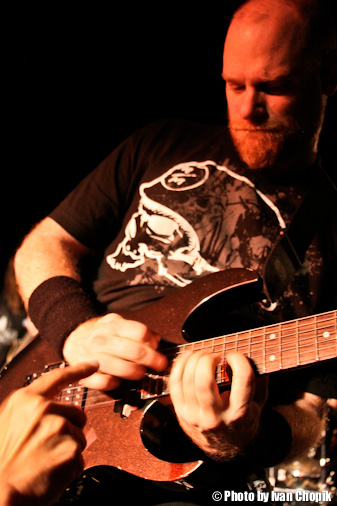
PN: The first album I got was Kiss’ Alive II – I got it on cassette from my older brother, and I was like: ‘Wow! [imitates Detroit Rock City riff]’ I was blown away by that. All of the guys at school, they were cool – they had started growing long hair and had AC/DC patches on their shirts and everything.
After that, I started listening to Metallica, Iron Maiden, Yngwie Malmsteen’s first album, and by the end of the 80’s I listened a lot to all of the guys from Shrapnel Records, like Cacophony with Marty Friedman and Jason Becker, Greg Howe, Joey Tafolla – all of these guys. I picked up a lot of stuff from them, and Steve Vai of course. Then I started listening a lot to jazz fusion guys, mostly Holdsworth. He became my number one guitar player.
IC: Going back just a couple years – I know one of the reasons you’ve mentioned for the split with Christian was musical differences. What sort of things did you not agree on?
PN: We didn’t agree on all sorts of things, but the thing that became the most important reason for the split was that we couldn’t agree on the way we wanted to run the band – how we wanted to tour and stuff like that. He didn’t want to tour as much anymore, and he didn’t want to do shows in different territories like: ‘Ah, I don’t want to play Scandanavia.’ Stuff like that.
IC: After several years of working together, why do you think there was a shift all of a sudden – especially after Holographic Universe came out and things were really looking up for you guys?
PN: We had problems working together since day one, I guess. Every album we did was a struggle. I guess you can see the situation from his side, too. I’m not wanting to blame everything on him, but we had a hard time. Often you could feel that it was us and him – it was two different camps that couldn’t agree on a lot of things.
IC: Musically?
PN: Yeah, musically and on many levels.
IC: Once you let him go from the band, at what point did you decide that you wanted to have two vocalists this time around?
PN: On the first tour we did back in 2006, Chris was having a hard time hitting the high notes and was a little bit out of tune, and one of our crew, the guitar tech, told us: ‘You guys should let him do the growling only and have someone else do the singing.’ So that was in the back of our heads, that it’s really hard for one guy to do both.
IC: Especially when it’s really extreme. There’s not much in between – it’s really quite opposite.
PN: Some of the stuff he did is really hard to sing, and if you do it in the studio, you have hours and hours to make it happen, but live you have to do it night after night – keeping your voice in shape for 20 or 30 days in a row. That’s hard. So we started looking for two guys right away.
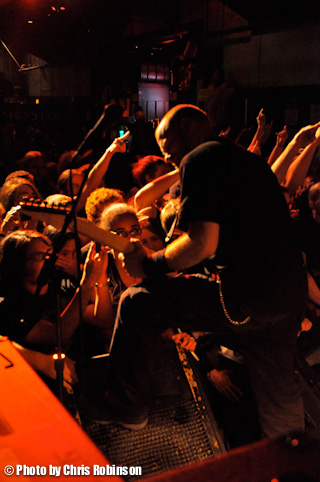
IC: Did those auditions come together quickly, or did it take you a while to find the right people?
PN: It came together pretty quickly. Actually, we knew Roberth [Karlsson, extreme vocalist] from before. From what I’ve heard from Christian, he was Christian’s influence as a growler himself. They’ve played in bands together before. We knew that he was a cool guy with an amazing voice, so he was our first choice. Then he turned us onto Lars [Palmqvist], who’s the clean vocalist now. We did an audition with them together – there’s a clip of it on YouTube.
IC: I know when you guys first announced that you had two vocalists, there were some mixed reactions from fans – they didn’t know what to expect, because they were used to hearing Christian on those records. What has the reaction been like from your fans since then?
PN: Mostly I think it’s been great. It’s always gonna be tough to introduce a new vocalist for any band. Mostly it’s on the Internet, people commenting on videos, like: ‘Wow! This sucks.’ When we’re out touring, I haven’t heard a negative comment from anyone. Perhaps people don’t want to say it to my face or something, but I think people are really embracing them, and most people also understand that we were put in an impossible situation with the previous lineup. We basically had the choice of splitting the band up or going a new way.
IC: How involved are you with the online scene – the forums and all that stuff? Do you check it out?
PN: Yeah, I’ve got my own Myspace, and we answer most fan mail that we get on our band Myspace and my own personal Myspace. I’ve got Facebook too and people contact me there, and I’m happy to answer any questions. Sometimes I go online on different forums. There’s a forum called sevenstring.org – I post there every once in a while. That’s especially dear to me, keeping in contact with the guitar underground.
IC: Scar Symmetry is your main gig right now, but do you have a day job when you go home, or are you able to do music full-time at this point?
PN: No, actually I take care of my mama, because she is handicapped. So I make a living out of helping her out with daily life, and I’ve got my studio set up in my parents’ house, so that I can combine that a bit.
IC: What are some of the things that you like to do when you’re not on tour?
PN: One of my favorite pastimes is cooking. I’m very much into cooking food. [laughs]
IC: What kind of food?
PN: Any kind.
IC: Looking forward, the band’s been around for about six years now – where do you see yourselves moving from here on out?
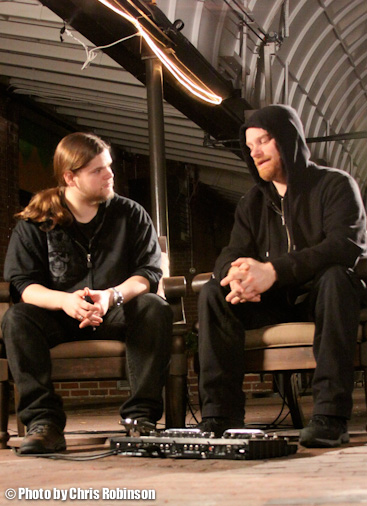
Ivan Chopik & Per Nilsson
PN: We’ll just continue putting out albums and touring. We’re working on a new album [The Unseen Empire – 4-15-2011] right now. We tracked the drums just two days before this tour. We’re trying to record all of the guitars on tour. We brought our laptops and audio interfaces.
IC: Maybe that explains how you guys are able to put out four albums within five years.
PN: Yeah, we write songs really fast. We’re like: ‘Oh, we have to make an album. We start in two weeks. Okay!’ A week later we’ll have ten songs or something.
IC: Back when Scar Symmetry first got together, Jonas was working at Black Lounge Studios, and I understand you were still studying.
PN: I can’t remember. I was studying for a while.
IC: What were you studying?
PN: I was studying some computer stuff, but I dropped out when we started the band.
IC: Was that the point when you decided that you would be a professional musician?
PN: Yeah, I guess so – when the first album came out and we started getting really positive reviews, and we got signed to Nuclear Blast.
IC: Is there any advice you can give young guitarists and aspiring musicians out there to help them reach their goals?
PN: Uh… no. [laughs] I don’t know. Just follow your dreams and practice, practice, practice.
[Special thanks to: Chris Robinson for his great intro and camera work, and Cigar Masters of Worcester, MA for their warm hospitality.]



